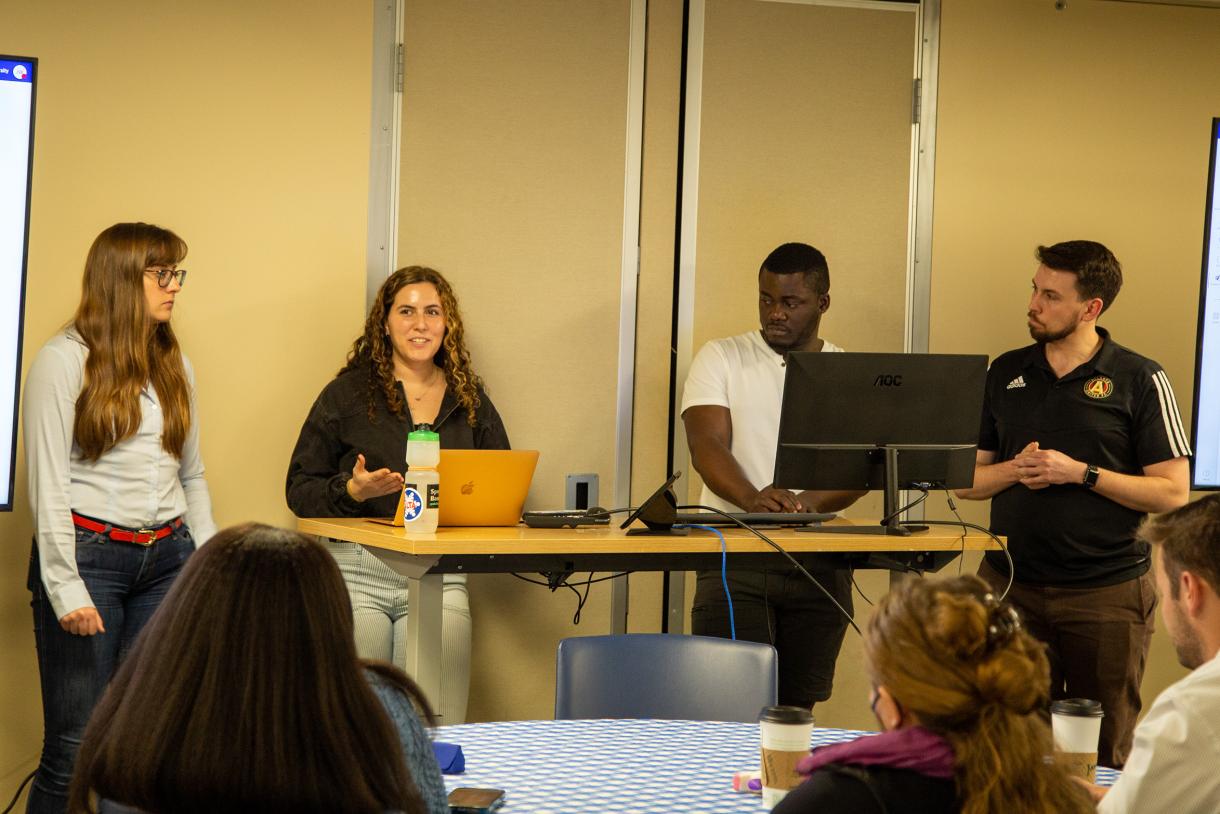
“Time for a vote,” said Patrice Barnett MEM ’23 to the other students in New Ventures: Climate. “Which of these technologies would you choose to pursue?” The vote—like the rest of the votes taken during this class session—was close.
Student teams were presenting their evaluations of the three climate-related startups they had been researching for the first half of the semester, considering each technology’s potential customers, market size, obstacles to adoption, maturity, sustainable competitive advantage, and capital requirements to be brought to market. Each presentation concluded with a reveal of which startup the team had selected to take on as a client; they would develop a strategy including target customers, a business model, a path to developing sustainable competitive advantage, and a roadmap of milestones to support an operating plan and finance decisions.
While the class voted narrowly for a lithium recycling technology that reduces extraction time and water usage, Barnett’s team chose a plant-based packaging coating that is much less expensive to produce than competitor options.

“I think your reasoning is good,” said Alexis Wells Carpenter, who co-instructs the course. “But I have some questions for you.” Had they fact checked that claim? What was the startup planning to do with funding? What market opportunities would the team pursue to the exclusion of others?
Wells Carpenter is Chief Innovation Officer of Triad Growth Partners/AxNano, a cleantech venture studio that develops and scales products that restore clean water, improve the lives of stakeholders in impacted communities, and create value for shareholders. She teaches New Ventures: Climate together with Triad Growth Partners CEO Doug Speight and Fuqua School of Business professor Jon Fjeld.
When building the course and finding startups for the students to research and advise, Wells Carpenter and Speight leveraged their network. They reached out to colleagues with early-stage companies operating in the climate and clean tech space as well as seeking out new connections with companies funded by Small Business Innovation Research (SBIR) grants.
“There wasn’t much convincing to be done,” Wells Carpenter said. “Our colleagues were very excited to be able to work with the talented individuals at Duke.”
The instructors assembled a menu of technologies in climate resilience, water, waste management, and energy/carbon sequestration, with students assigned to teams according to their areas of interest. Students researched technologies that could pull out higher quantities of valuable materials from solar panels ready to be recycled; allow space rocket operators to launch satellites without carbon emissions; provide “water insurance” to ensure communities had fresh water after disasters.
These were all exciting and promising technologies—but it was up to the teams to decide, after half a semester of research, which ones they thought had the highest potential for impact and profit at this moment in time.
Fjeld explained that one valuable aspect of the course is its interdisciplinary nature, drawing together students from across Duke. “It’s been fascinating to see the different lenses these students look through,” he said. “This class is really about being creative and being able to ask the right questions and imagine different solutions. When you have a diverse group, you’re going to get more questions and more solutions.”

“I’ve appreciated the opportunity to work with students from a breadth of disciplines,” said Liz Mullen MEM/MBA ’23. Mullen also pointed out the value of working directly with companies to gain hands-on experience. She is on the team working with Sustaera, a direct air capture technology company, to conduct research on the company’s customers, business model, and Series B fundraising.
“A year ago, venture capitalists weren’t willing to bet on direct air capture technology,” Mullen explained. “But thanks to a conducive policy environment, this technology is primed for tremendous growth. It’s been exciting to witness this firsthand in the course.”
Dmytro Zlenko MEM ’24 said that the class, particularly through its guest speakers, has impressed upon him that climate ventures need to be profitable to be impactful. “This course has given me a real perspective on the business world of the environment,” he said. (The importance of finding paying customers was a theme of the team presentations. Yes, state and national parks needed a solution for algae blooms—but cruise lines and resorts were the ones who could pay.)
Reflecting on the progress students have made this semester, Wells Carpenter shared the story of one group who interviewed a sustainable cattle farmer in California to learn how water scarcity affects the farmer’s business, explore how the issue is currently being addressed, and gauge the farmer’s willingness to try a new service that would mitigate future risk.
“We’ve talked a lot about doing customer discovery to test underlying assumptions about who is willing to pay for a product or service and why,” she said. “This group learned the importance of getting out and talking to people to learn insights they couldn’t get from Googling or reading market reports.”
The students’ passion for tackling environmental challenges has been evident, Wells Carpenter said, in the enthusiasm they have brought to their research on everything from red tide algae blooms to sustainable aviation fuel.
“I’ve loved hearing their fresh perspectives on the global issues we’re looking to solve,” she said. “I hope this course has introduced them to some of the tools needed to begin strategizing on these and other solutions.”